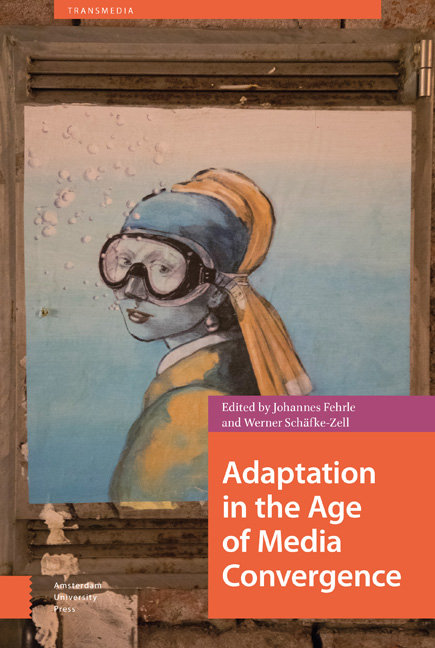Book contents
- Frontmatter
- Contents
- 1 Introduction: Adaptation in a Convergence Environment
- 2 Adaptation as Connection: A Network Theoretical Approach to Convergence, Participation, and Co-Production
- 3 Filing off the Serial Numbers: Fanfiction and its Adaptation to the Book Market
- 4 From Paratext to Polyprocess: The “Quirky” Mashup Novel
- 5 “You Just Got Covered”: YouTube Cover Song Videos as Examples of Para-Adaptation
- 6 Masters of the Universe? Viewers, the Media, and Sherlock's Lead Writers
- 7 Alien Adapted (Again and Again): Fictional Universes between Difference and Repetition
- 8 “Everything is Awesome:” Spreadability and The LEGO Movie
- 9 Localization as Adaptation in the Wolfenstein Franchise
- Index
6 - Masters of the Universe? Viewers, the Media, and Sherlock's Lead Writers
Published online by Cambridge University Press: 21 November 2020
- Frontmatter
- Contents
- 1 Introduction: Adaptation in a Convergence Environment
- 2 Adaptation as Connection: A Network Theoretical Approach to Convergence, Participation, and Co-Production
- 3 Filing off the Serial Numbers: Fanfiction and its Adaptation to the Book Market
- 4 From Paratext to Polyprocess: The “Quirky” Mashup Novel
- 5 “You Just Got Covered”: YouTube Cover Song Videos as Examples of Para-Adaptation
- 6 Masters of the Universe? Viewers, the Media, and Sherlock's Lead Writers
- 7 Alien Adapted (Again and Again): Fictional Universes between Difference and Repetition
- 8 “Everything is Awesome:” Spreadability and The LEGO Movie
- 9 Localization as Adaptation in the Wolfenstein Franchise
- Index
Summary
Abstract
This chapter focuses on the representation of the tabloid press in the second and third series of Sherlock and, in turn, on the series’ lead writers and their handling of publicity for Sherlock 's third series in January 2014. Expectations for the new series were high, as Sherlock 's popularity had grown and intensified in the two-year hiatus between series two and three. Gatiss and Moffat became increasingly visible as public figures, as interest in Sherlock spilled over into press and fan interest in the making of Sherlock . The chapter raises the question of whether Sherlock itself took a political stance in response to news events of the time, and whether its two lead writers acted as political agents, as well as cultural agents.
Key words: Sherlock; Mark Gatiss; Steven Moffat; showrunners; adaptation; villains
Introduction
During the publicity surrounding the screening of series three of Sherlock, the BBC's modernized adaptation of the Sherlock Holmes stories, in January 2014, a great deal was heard from the show's co-creators, Mark Gatiss and Steven Moffat. Moffat in particular appeared in several public fora, defending the show's new direction. Series three marked a turning point for Sherlock where the actors’ off-screen lives suddenly became much more visible on-screen: in addition to lead writer Gatiss also playing Sherlock's brother Mycroft, Martin Freeman (John Watson)'s then-wife in real life, Amanda Abbington, joined the cast as John's wife Mary, and the real-life parents of Benedict Cumberbatch (Sherlock), Timothy Carlton and Wanda Ventham, made cameo appearances as Sherlock and Mycroft's parents. In addition, this was the first series to feature a final villain who was not Jim Moriarty. Gatiss and Moffat chose a media magnate, Charles Augustus Magnussen, as their designated super-villain, a character based on a blackmailer in the Conan Doyle stories, Charles Augustus Milverton. Such a modernizing character adaptation was bound to attract interest for its topicality, especially given the recently concluded Leveson Inquiry, set up by the British government to investigate the ethics and practices of the British press. To underline this connection, Magnussen is first seen on screen giving evidence in front of some kind of official inquiry.
- Type
- Chapter
- Information
- Adaptation in the Age of Media Convergence , pp. 133 - 158Publisher: Amsterdam University PressPrint publication year: 2019



